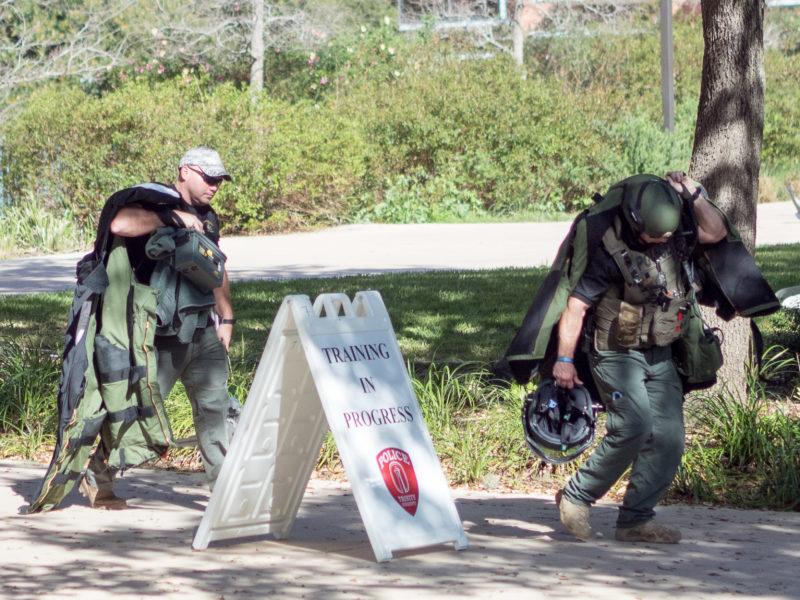The initiative tested new software systems and communications.
Trinity University recently conducted a full-scale bomb exercise. TUPD officers and crisis management team members in responded to a faux explosive device placed on the third floor of the Library.
“The crisis management team is made up primarily of associate vice presidents, directors of departments, subject matter experts in their field or department heads or above,” said Ivan Pendergast, Emergency Management Coordinator. “TUPD takes the role of incident command. Our concern is our students first and foremost. Making sure that messages go out and everyone knows what’s going on.”
The drill began at 9:30 a.m. on Feb. 24th. A fake call from a disgruntled university employee informed staff at the library of a planted explosive device. TUPD officers then entered the building, located the olive green canister placed inside of Eco Grounds and preceded to clear the entirety of the library for the next three hours.
It was one of the instances in which the university conducted a full-scale exercise.
“You’ll have outside responders like the city of San Antonio police department bomb squad, special operations division, the fire department, the EMS and the FBI,” said Paul Chapa, Chief of Trinity University Police Department. “You have these multiple agencies on campus with our response, the library response, with the student response and with the emergency notification response. All of these elements come together for a full-scale exercise.”
While responses to the crisis came swiftly, there were standard delays of response. Chief Chapa discussed the value in monitoring those amounts of time spent between call and response.
“One thing we’ve learned, I kinda knew but others kinda learned for the most part, is its hurry up and wait,” Chapa said. “Nothing is going to happen quickly. There’s so many things that need to be uncovered, issues taken into consideration and calls to be made, all these protocols are in place.”
As response teams assembled, the crisis management team began assembling details on the situation. The exercise presented an opportunity to test new initiatives.
“We tested out a few things,” Pendergast said. “We have a veil on the website that drops down onto the man website and informs anyone who visits that website what’s going on. We tested that system on a mock website.”
This was also the first time that an executive group was brought into the situation process.
“We also tested communications between the executive group and our group,” Pendergast said. “In the past we made a phone call to the president to let him know what was going on. This was the first time that the executive group, all of the main vice presidents met together on their side to help work within their role to see what needed to happen for the university.”
An executive branch had never been included to this degree before. It allowed a new group to better understand how they play into the response.
“I think the point of the exercise was to identify our role,” said Deneese “Dee” Jones, Vice President for Academic Affairs. “Essentially, I think what we learned from the exercise is that we need to be able to be a resource. That command center is taking care of all the details. There were three things we really wanted to give out in our message. That we wanted to protect life, protect property and wanted to protect reputation.”
Other technological advances were also tested during the exercise.
“A key for me was use of a software program called interactive voice response, or IVI,” said Don Van Eynde, chair of the Crisis Management Team and the creator of the simulation. “A telephone call goes out to everyone registered on Trin Alert. You pick up and it asks are you safe? If yes, inform your loved ones of that. But if you press no, it asks what your situation is. You can record and then give your location. We’ve been looking for a program that will do that for eight months. I think we’ve found it.”
The exercise diverted foot traffic away from parts of the library leading to buildings like the Chapman center and the Halsell center. Despite the inconveniences, the timing of the exercise was necessary.
“Look at the national climate and other higher educational institutions across the nation,” Chapa said. The national climate has changed. More of these situations are brought to light. They’ve always existed to one scale or another, but now they’re getting that media attention, which they never had before. Now more than ever, for us to conduct these exercises are important. Why would I want to do this during the summer when nobodies here?”
The exercise ended around 11:30 a.m., allowing students to return to the library. A general sentiment that the operation went successfully was coupled with observations on what could be improved in the future.
“I think we need a better clarification of the roles of the executive team versus the roles of the crisis management team,” Van Eynde said. “The role of the crisis management team is to handle things at an operational level. The executive team is supposed to deal at the strategic level.”
The campus will have other drills testing various other security systems in the upcoming future.
“We’ve done active shooter, we’ve done bomb threat and now I think the next full-scale exercise probably needs to be focused on internal operations,” Chapa said. “It would probably be a practical exercise with IT. You’re talking about academics, payroll, institutional fiscal management, all of those things. I think it would be challenging.”







